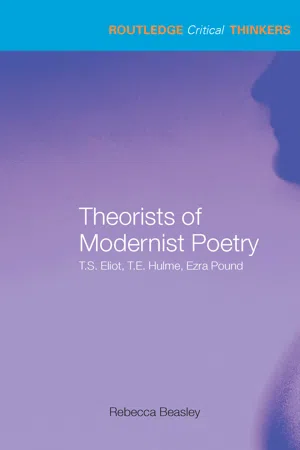
- 148 pages
- English
- ePUB (mobile friendly)
- Available on iOS & Android
About this book
Modernist poetry heralded a radical new aesthetic of experimentation, pioneering new verse forms and subjects, and changing the very notion of what it meant to be a poet. This volume examines T.S. Eliot, T.E. Hulme and Ezra Pound, three of the most influential figures of the modernist movement, and argues that we cannot dissociate their bold, inventive poetic forms from their profoundly engaged theories of social and political reform.
Tracing the complex theoretical foundations of modernist poetics, Rebecca Beasley examines:
- the aesthetic modes and theories that formed a context for modernism
- the influence of contemporary philosophical movements
- the modernist critique of democracy
- the importance of the First World War
- modernism's programmes for social reform.
This volume offers invaluable insight into the modernist movement, as well as demonstrating the deep influence of the three poets on the shape and values of the discipline of English Literature itself. Theorists of Modernist Poetry is relevant not only to students of modernism, but to all those with an interest in why we study, teach, read and evaluate literature the way we do.
Frequently asked questions
- Essential is ideal for learners and professionals who enjoy exploring a wide range of subjects. Access the Essential Library with 800,000+ trusted titles and best-sellers across business, personal growth, and the humanities. Includes unlimited reading time and Standard Read Aloud voice.
- Complete: Perfect for advanced learners and researchers needing full, unrestricted access. Unlock 1.4M+ books across hundreds of subjects, including academic and specialized titles. The Complete Plan also includes advanced features like Premium Read Aloud and Research Assistant.
Please note we cannot support devices running on iOS 13 and Android 7 or earlier. Learn more about using the app.
Information
Table of contents
- Cover
- Half Title
- Title Page
- Copyright Page
- Table of Contents
- Series Editor’s preface
- Acknowledgements
- KEY IDEAS
- AFTER ELIOT, HULME AND POUND
- FURTHER READING
- Works Cited
- Index